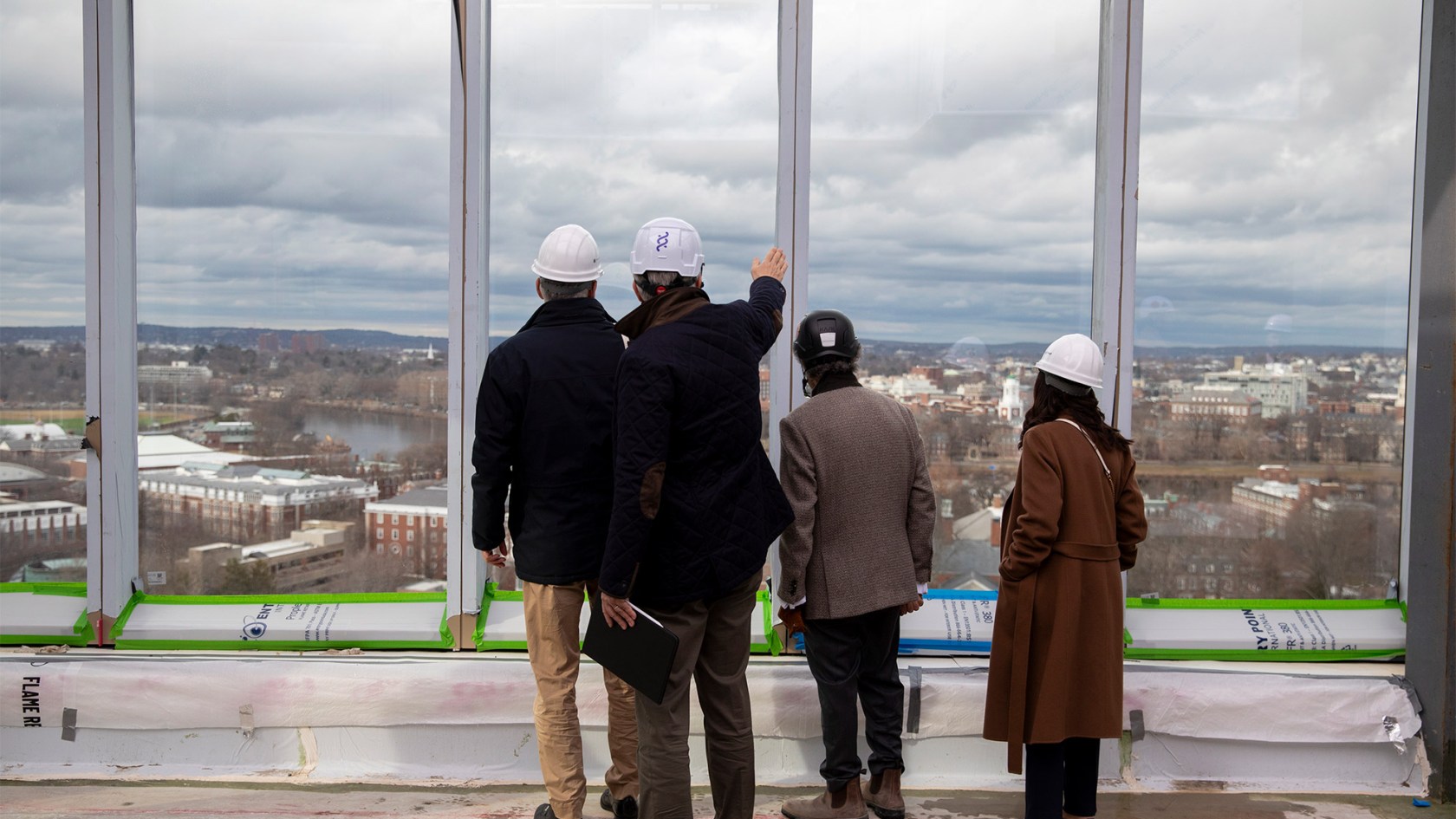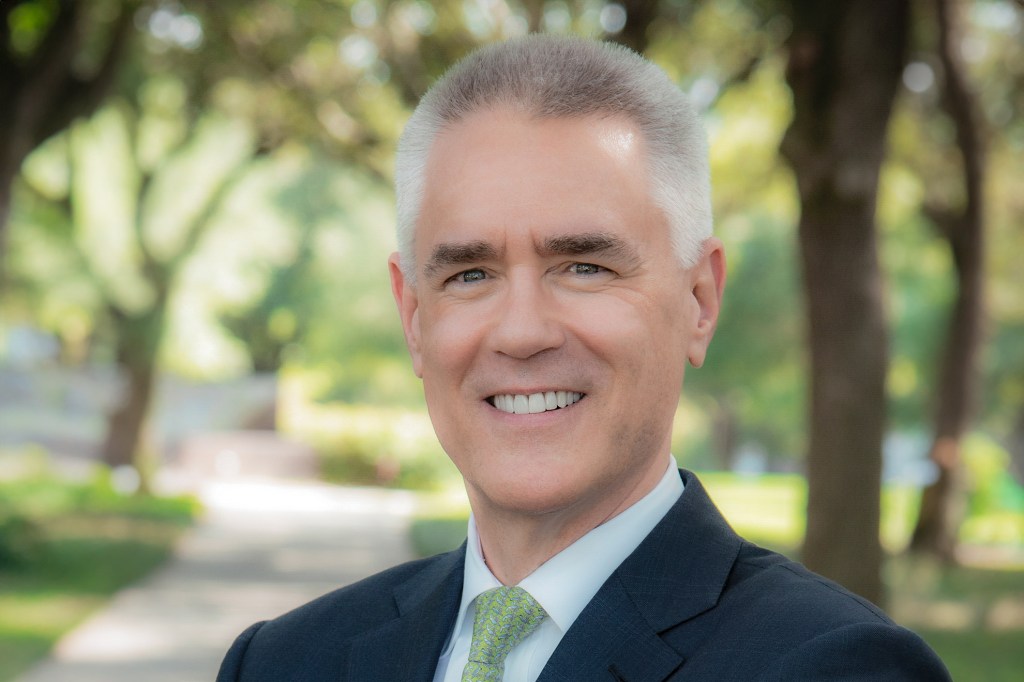Harvard to advance corporate engagement strategy

Roche Genentech Innovation Center Boston will be based at Harvard’s Enterprise Research Campus in Allston, which they toured during its construction phase in March.
Veasey Conway/Harvard Staff Photographer
Findings by 2 committees highlight opportunities for growth and expansion
Harvard is preparing to advance its corporate engagement strategy, based upon recommendations published last year by two ad hoc committees. Those committees found that the University could benefit from broadening and strengthening corporate engagement aligned with its core mission and values. Since assuming his role as provost, John Manning has continued to support this work as it has moved toward implementation.
The Corporate Relations Research Policy (CRRP) Committee, chaired by John Shaw, vice provost for research, and the Corporate Relations Researcher Engagement (CRRE) Committee, chaired by Amy Wagers, chair of the Department of Stem Cell and Regenerative Biology and the Forst Family Professor of Stem Cell and Regenerative Biology, undertook a review of the University’s current policies, processes, and support related to engaging with corporations. Supported through the Office of the Vice Provost for Research (OVPR), the committees published a series of recommendations aimed at better coordinating work across the University, exploring new ideas for engagement, and ensuring that students and faculty have the appropriate safeguards when engaging in corporate work.
“As a faculty member, and later as provost, I had witnessed the many benefits that can emerge when academic institutions and industry work together for the common good,” said President Alan M. Garber, who convened the committees in June 2023 as provost. “That’s why I asked Vice Provost for Research John Shaw to determine how we might facilitate those collaborations, including through the creation of these committees. Their work is enabling Harvard to leverage and create opportunities to both further our academic mission and push the frontiers of research, ultimately benefiting the public. I am excited to see the many ways in which our excellence will flourish as we implement the committees’ recommendations.”
For many years, Harvard has engaged with private corporations and related entities as a way to inform and strengthen its intellectual mission, support scholarship and students, and translate research discoveries to benefit society broadly. Current examples of corporate engagements include:
- Harvard’s relationship with Roche, recently strengthened by the announcement of the Roche Genentech Innovation Center Boston, based at Harvard’s Enterprise Research Campus in Allston.
- The Fujifilm fellowship, launched in 2019, awards up to two years of research funding to promising Ph.D. students across 14 programs spanning Harvard Medical School, the Harvard Kenneth C. Griffin Graduate School of Arts and Sciences, and the Harvard T. H. Chan School of Public Health.
- In 2022, Amazon Web Services (AWS) provided both sponsored and philanthropic support to advance fundamental research and innovation in quantum computing, as well as enable the AWS Impact Computing Project at the Harvard Data Science Institute, a collaboration aimed at reimagining data science to identify potential solutions for society’s most complex challenges.
- Through the efforts of the Office of Technology Development (OTD), a wide range of corporate sponsorships and University-wide research alliances with companies, including Deerfield Management, Tata Group, and UCB, have helped advance scientific discovery across the University.
The CRRP Committee was charged with assessing and envisioning mechanisms for advancing corporate engagement in research support. The CRRE Committee was charged with identifying the roles and responsibilities of faculty and other researchers engaged in corporate-sponsored research and recommending safeguards to ensure these relationships are aligned with the University’s mission and benefit all those who participate. Both committees had inclusive representation of faculty and staff from across Harvard’s Schools and central administration and reached their recommendations with the aid of input from students and other stakeholders across the University, as well as from corporate entities that have established agreements with the University.
“While Harvard has benefited from corporate engagement within various Schools, departments, and centers, the research done by CRRP showed that engagement could be strengthened by a University-wide strategy and approach,” said Shaw. “Expanding the mechanisms we have to enable corporate alliances, and further enhancing coordination across the University, will allow us to strengthen the ways we support research.”
“The CRRE Committee’s review of corporate engagement from a stakeholder perspective found that interest and participation in corporate partnerships have both expanded and evolved in recent years, offering exciting opportunities for creative and unique programs beyond the traditional sponsored research agreements and graduate fellowship programs,” said Wagers. “With appropriate policies and safeguards in place for our students, faculty, and other researchers, our Harvard community stands to realize great benefits from increased engagement with corporate partners.”

Steven Currall was named the executive director and associate vice provost for academic-corporate initiatives.
Photo by Ryan Noone/University of South Florida
New executive director and associate vice provost for academic-corporate initiatives to drive steering committee and implementation
One of the top recommendations to emerge from the committees was to establish a Corporate Relations Steering Committee as a resource to foster University-wide coordination of corporate engagement activities that support research and build upon institutional strengths and capacity. Envisioned as a small, nimble group, made up of faculty members engaged in corporate collaboration and leadership from OVPR, OTD, and the University Development Office (UDO), the steering committee will:
- Provide a University-wide strategy that considers the breadth of potential engagements including gifts, sponsored research, and new types of agreements;
- Provide guidance for complex corporate engagements that span many different forms of opportunity across the University, including those that contain gifts and sponsored research or other components;
- For instances of complex engagement, provide streamlining and support to ensure expedient and thorough review.
Other recommendations included expanding training and building awareness of policies and procedures, developing models and roadmaps for corporate engagement, creating a database of current engagements, and initiating pilot programs in priority research areas.
To lead this work, a core operational team of the steering committee has been established with leadership from Sam Liss (OTD), Anne Gotfredson (UDO), and Steven Currall (OVPR), who began June 16 as the new executive director and associate vice provost for academic-corporate initiatives. Currall served as special adviser to both committees, providing advisory support, data collection and analyses, and benchmarking. He is currently an associate in the John A. Paulson School of Engineering and Applied Sciences.
Prior to joining Harvard, Currall was dean of the Graduate School of Management at the University of California, Davis; provost and vice president for academic affairs at Southern Methodist University; and president of the University of South Florida. He previously served as a commissioner of the U.S. Council on Competitiveness, which is made up of university and corporate leaders committed to bolstering America’s investments in innovation, technology, and infrastructure. His publications have appeared in Nature, Nature Nanotechnology, Nature Reviews Bioengineering, Issues in Science and Technology, and leading management journals such as Organization Science.
“There is so much opportunity for Harvard to engage strategically with corporate entities across the University in ways that align with our academic mission and increase our ability to benefit society,” said Currall. “During our research for the committees, we heard from corporations who want to make a positive impact on the world and want to build a relationship with a university committed to the same goal.”
OVPR, in partnership with OTD, will launch this new effort with a series of workshops this summer to support faculty in advancing their research through corporate engagement. The workshops will also help clarify the current policies and mechanisms for corporate engagement, and begin to consider the opportunities for working strategically across the University.
“Corporate alliances play a vital role in advancing Harvard’s research programs and innovation,” said Vivian Berlin, executive director at Harvard Medical School and managing director of strategic partnerships at OTD. “At OTD, we look forward to continuing our support of Harvard researchers across the University to expand engagement with our corporate and venture collaborators.”
Following the workshops, one of the first initiatives the steering committee will undertake will be to identify and support innovative pilot projects, per the recommendations contained in the reports. These projects will foster connections between faculty-led research efforts across Schools in ways that allow Harvard to proactively identify and advance opportunities for investment and direct engagement in research from corporate entities. A call for faculty proposals is forthcoming.
“More extensive and better integration with corporate partners is critical to rapidly advancing our discoveries to the medicines that can help patients in need,” said Mark Namchuk, Puja and Samir Kaul Professor of the Practice of Biomedical Innovation and Translation and executive director of therapeutics translation. “This new effort will help faculty across the University to advance their own research and amplify its benefit to society as a whole.”
More information can be found on the Harvard Corporate Engagement website.




